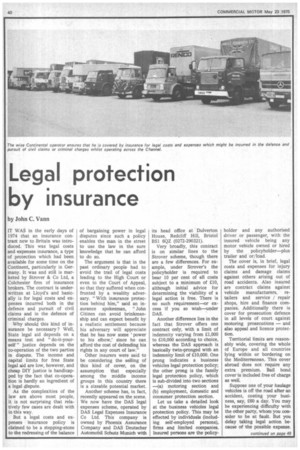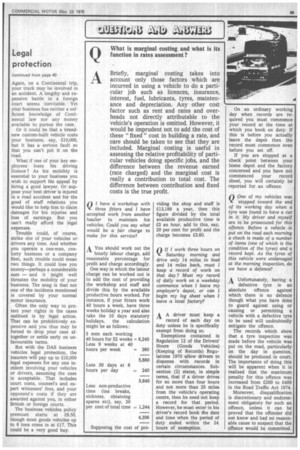Legal protection by insurance
Page 44

Page 53

If you've noticed an error in this article please click here to report it so we can fix it.
by John C. Vann
IT WAS in the early days of 1974 that an insurance contract new to Britain was introduced. This was legal costs and expenses insurance, a type of protection which had been available for some time on the Continent, particularly in Germany. It was and still is marketed by Strover & Co Ltd, a Colchester firm of insurance brokers. The contract is underwritten at Lloyd's and basically is for legal costs and expenses incurred both in the defence and pursuit of civil claims and in the defence of criminal charges.
Why should this kind of insurance be necessary ? Well, State legal aid depends on a means test and " do-it-yourself " justice depends on the co-operation of the two parties in dispute. The income and capital limits for free State legal aid are low, however, and cheap DIY justice is handicapped by the fact that co-operation is hardly an ingredient of a legal dispute.
As the complexities of the law are above most people, it is not surprising that relatively few oases are dealt with in this way.
But a legal costs and expenses insurance policy is claimed to be a stepping-stone to the redressing of the balance of bargaining power in legal disputes since such a policy enables the man in the street to use the law in the sure knowledge that he can afford to do so.
The argument is that in the past ordinary people had to avoid the trail of legal costs leading to the High Court or even to the Court of Appeal, so that they suffered when confronted by a wealthy adversary. "With insurance protection behind him," said an insurance spokesman, " John Citizen can avoid brinkmanship and can expect benefit by a realistic settlement because his adversary will appreciate that he has now some 'power to his elbow,' since he can afford the cost of defending his rights in any court of law."
Other insurers were said to be considering the selling of this kind of cover, on the assumption that especially among the middle income groups in this country there is a sizeable potential market.
Another scheme has, in fact, recently appeared on the scene. We now have the DAS legal expenses scheme, operated by DAS Legal Expenses Insurance Co Ltd. This company is owned by Phoenix Assurance Company and DAS Deutscher Automobil Schutz Munich with its head office at Dulverton House, Redcliff Hill, Bristol BSI 6QZ (0272-290321).
Very broadly, this contract is on similar lines to the Strover scheme, though there are a few differences. For example, under Strover's the policyholder is required to bear 10 per cent of all costs subject to a minimum of E10, although initial advice for determining the viability of a legal action is free, There is no such requirement—or excess if you so wish—under DAS.
Another difference lies in the fact that Strover offers one contract only, with •a limit of indemnity varying from £1,000 to E10,000 according to choice, whereas the DAS approach is basically twin-pronged with an indemnity limit of £10,000. One prong indicates a business vehicles legal protection policy; the other prong is the family legal protection policy, which is sub-divided into two sections —(a) motoring section and (b) employment, domestic and consumer protection section.
Let us take a detailed look at the business vehicles legal protection policy. This may be effected by individuals (including sell-employed persons), firms and limited companies. Insured persons are the policy holder and any authorised driver or passenger, with the insured vehicle being any motor vehicle owned or hired by the policyholder—plus trailer and or/load.
The cover is, in brief, legal costs and expenses for injury claims and damage claims against others arising out of road accidents. Also insured are contract claims against vehicle manufacturers, retailers and service / repair shops, hire and finance companies. Additionally there is cover for prosecution defence in all levels of court against motoring prosecutions — and also appeal and licence protection.
Territorial limits are reasonably wide, covering the whole of Europe and all countries lying within or bordering on the Mediterranean. This cover abroad does •nat require any extra premium. Ball bond. cover is included free of charge as well.
Suppose one of your haulage vehicles is off the road after an accident, costing your business, say, £60 a day. You may be experiencing difficulty with the other party, whom you consider to be at fault. But you delay taking legal action because of the possible expense. Again, on a Continental trip, your truck may be involved in an accident. A lengthy and expensive battle in a foreign court seems inevitable. Yet your business has neither a sufficient knowledge of Continental law nor any money available to pursue the case.
Or it could be that a brandnew custom-built vehicle costs your business, say, £10,000, but it has a serious fault so that you can't put it on the road.
What if one of your key employees loses his driving licence ? As his mobility is essential to your business you wish to support his appeal by hiring a good lawyer. Or suppose your best driver is injured in a road accident and for the good of staff relations you would like to help him to claim damages for his injuries and loss of earnings. But you can't really afford the legal expenses.
Trouble could, of course, strike one of your vehicles or drivers any time. And whether you operate a one-man, onelorry business or a company fleet, such trouble could mean two things. It could lose you money—perhaps a considerable sum — and it might well threaten the mobility of your business. The snag is that not one of the incidents mentioned is covered by your normal motor insurance.
Often the only way to protect your rights in the cases outlined is by legal action. That can be prohibitively expensive and you thus may be forced to drop your case altogether or settle early on unfavourable terms.
But with the DAS business vehicles legal protection, the insurers will pay up to £10,000 legal expenses for any one incident involving your vehicles or drivers, assuming the case is acceptable. That includes court costs, counsel's and expert witnesses' fees, and your opponent's costs if they are awarded against you, in either British or foreign courts.
The business vehicles policy premium starts at £8.50, though most goods vehicles up to 6 tons come in at £17. This could be a very good buy.






























































































